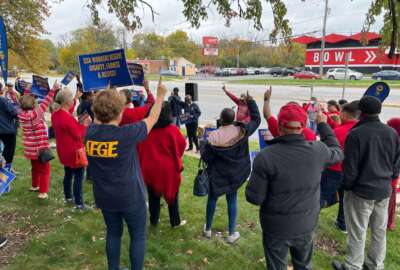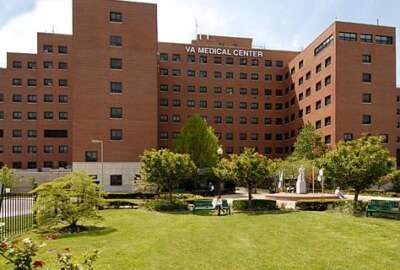
Nurses at one Veterans Affairs facility win a double-digit pay increase
Registered nurses working for the Veterans Health Administration in Las Vegas recently got a 12% raise. This after promising to hold a big rally. That got...
Best listening experience is on Chrome, Firefox or Safari. Subscribe to Federal Drive’s daily audio interviews on Apple Podcasts or PodcastOne.
Registered nurses working for the Veterans Health Administration in Las Vegas recently got a 12% raise. This after promising to hold a big rally. That got management to sit down with the Title 38 employees. For the details, the Federal Drive with Tom Temin talked with Linda Ward-Smith, president of Local 1224 of the American Federation of Government Employees.
Interview transcript:
Tom Temin: Let’s start with what is available to Title 38 employees because under Title V, and under other statutes, you can’t bargain over pay and benefits with the federal government. But Title 38 Sounds like a different cat.
Linda Ward-Smith: That is correct. Actually, [the Department of Veterans Affairs]’s own handbook states that every year, the VA will go out and survey the market to see if the pay is competitive to the market. And if it’s not competitive, the agency will do all it could to be competitive. Not be the high payer of the market, but actually compete. And we discovered throughout the last four to five years, these surveys had not been done. And so we’re playing catch up, so to speak. So the agency did decide to sit down with us, the local union, and have that discussion and actually raised the nurses wages up by 12%. I do want to say that there’s also Title V employees who actually do fit into this category. Just by Congress alone converting some professions over to the Title 38 pay system, they now actually take advantage of this pay system and their wages are being reviewed, and actually being raised as well. So we have a win-win, not just for nurses and doctors, but actually for some of our groups like our radiologists, a psychologist or a social worker, so they’re all reaping the benefit right now as we speak.
Tom Temin: And [AFGE] 1224 covers all of the medical people at VA in Las Vegas, or just the nurses, or who do you cover?
Linda Ward-Smith: We cover all professions, from the EMS workers, which is our janitorial system all the way up to cafeteria and to the nurses and doctors. So we cover them all.
Tom Temin: And give us a sense of the size of the Las Vegas — this was the Las Vegas Medical Center, was it one of the major installations of VA?
Linda Ward-Smith: Yes. Currently, we have over 3,100 bargaining unit employees that we are covering. So yeah, we’re pretty large now. We grew pretty rapidly over the years.
Tom Temin: And therefore it was determined, it sounds like let’s say someone at the Howard Hughes Medical Center, the other areas that offer health care in Las Vegas, were simply paying more than VA by a lot.
Linda Ward-Smith: Yes. So how that works is the agency goes out and surveys, they pay for these wage surveys, actually. And they survey the market. And then they get those surveys back and based on the average is how they compute, I guess, what they’re going to pay the employees.
Tom Temin: And what did they say? I mean, if you noticed that they hadn’t been doing this for five years, what kinds of conversations ensued here before the threatened rally?
Linda Ward-Smith: A lot of the blame has been put on the modernization that has occurred through the VA system over the last I want to say maybe about four to five years, where HR or the human resources department now has taken over everything, including compensation, wages, and all that good stuff. So the agency states that it was the fault of HR, who had not been doing the surveys like they should have been, and the local really does not have any control. So when they discovered this, supposedly they decided that yes, there is something going on, and we need to fix it. And that is why they were willing to come to the table so quickly, and do what they could to assist.
Tom Temin: We’re speaking with Linda Ward Smith, president of local 1224 of the American Federation of Government Employees, which represents nurses, and other staff really, at the Veterans Health Administration. And the press release from AFGE said it was the threat of the rally that got them into action. What were you planning to do?
Linda Ward-Smith: Full transparency: I have been meeting with my local administration, with the director and the deputy director for several months leading up to the threat of the rally, hopefully to try to settle things without having to take it to the extreme. And they have been saying it’s coming, it’s coming. But HR, of course, was slow to to act. And of course, the employees don’t want to hear that, right? So, you know, after so many “it’s coming, it’s coming,” I had to do something and the nurses actually wanted to rally and just say we’re serious about this. So I did let our director know, hey, we can’t keep putting this off. I mean, it’s been several years, we need to do something. And actually, they asked if we can just hold off on the rally. And they met with me and said that this is what we have in the works. And within two pay periods actually, the nurses were paid.
Tom Temin: Because Las Vegas is something of a union town. So you probably would have had some good solidarity from the other, I don’t know, the casino unions or whatever, there’s a lot of unions operating in those hotels, the convention center, you feel like you would have had some, maybe, lift under the wings if that had happened?
Linda Ward-Smith: Actually, we’ve been very successful throughout the last couple of years with many rallies, and our rallies do usually yield a lot of media coverage. So I think that may have had something to do with it.
Tom Temin: Now what about the other employees at the Las Vegas Medical Center? The nurses now are taken care of, you’ve got doctors, you’ve got administrators, I think even part of that Title Five that are coming under the Title 38 pay system. And then the people that are down lower doing the kind of day to day drudgery that keeps the hospital actually operating.
Linda Ward-Smith: Yeah, so that was one of my concerns as well. I didn’t want it to look as if I just took care of the nurses and nobody else, right? So I did also state to the other employees, because like I said, they’ve actually been working on a lot of the schedules, like our psychologists, our social workers, our radiologists have been getting their pay throughout the last several months. It was like it was slow for the nurses to get paid. And that was kind of weird to me; I was going to take it somewhere else — but I didn’t — and say, “these are a large body of women. Why are we so slow with the nurses?” But I didn’t go there. So yes, that was kind of puzzling. And we do still have GS employees, of course, who still feel like okay, our wages don’t climb like they should, and we need to fix it. And we all know, well, the GS system does really need to be fixed, in my opinion. It is slow; the raises don’t happen as rapidly and I don’t think that they’re competitive either. So that’s an act of Congress which I believe should be addressed.
Copyright © 2025 Federal News Network. All rights reserved. This website is not intended for users located within the European Economic Area.
Tom Temin is host of the Federal Drive and has been providing insight on federal technology and management issues for more than 30 years.
Follow @tteminWFED
Related Stories





